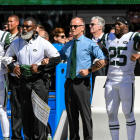The NFL unveiled its new national anthem policy on Wednesday, and rather than putting the most controversial issue of the 2017 season to rest, the policy has brought the issue of kneeling during the anthem to protest social inequality back to the forefront of the discussion around the league.
"This season, all league and team personnel shall stand and show respect for the flag and the anthem," Goodell said in a statement. "Personnel who choose not to stand for the anthem may stay in the locker room until after the anthem has been performed. The 32 member clubs of the National Football League have reaffirmed their strong commitment to work alongside our players to strengthen our communities and advance social justice."
Colin Kaepernick, who is currently suing the owners for colluding to keep him out of the NFL, first took a knee in August 2016 as a means to draw attention to social inequality in this country.
Blowback to the change was swift. Eagles safety Malcolm Jenkins was one of several players to slam the new policy, saying, "Everyone loses when voices get stifled." And Jets chairman Christopher Johnson, who is acting as owner while his brother, Woody Johnson, serves as the United States ambassador to the United Kingdom, said the team will cover any fines incurred by Jets players for violating the anthem policy.
"I do not like imposing any club-specific rules," Johnson said, via Newsday. "If somebody [on the Jets] takes a knee, that fine will be borne by the organization, by me, not the players. I never want to put restrictions on the speech of our players. Do I prefer that they stand? Of course. But I understand if they felt the need to protest.
"There are some big, complicated issues that we're all struggling with, and our players are on the front lines. I don't want to come down on them like a ton of bricks, and I won't. There will be no club fines or suspensions or any sort of repercussions. If the team gets fined, that's just something I'll have to bear."
United States Congressman Peter King, who represents part of Long Island, was not happy with Johnson's remarks.
Disgraceful that @nyjets owner will pay fines for players who kneel for National Anthem. Encouraging a movement premised on lies vs. police. Would he support all player protests? Would he pay fines of players giving Nazi salutes or spew racism? It’s time to say goodbye to Jets!
— Rep. Pete King (@RepPeteKing) May 26, 2018
Congressman King did not immediately elaborate on why he believes that kneeling for social inequality is "premised on lies vs. police."
On Friday, 50 a civil rights group called the National Action Network protested outside the NFL's Manhattan headquarters, calling on the league to "reverse that immoral and unconstitutional decision" regarding the new policy, according to the Associated Press.
In Illinois, Congresswoman Robin Kelly has called on Bears owner Virginia McCaskey to explain how the team plans to enforce the anthem policy, according to SBNation, including the club's policy on free speech. And while First Amendment rights pertain to the government and not private business, Kelly notes that many of the NFL's stadiums are publicly financed.
"Given the investment of taxpayer dollars, the NFL and its team should be held to the highest possible public standard, especially when it comes to protecting and defending the First Amendment rights on players, employees, and fans," Kelly wrote in a letter to McCaskey.
"I'm an NFL fan, but the league's new anthem policy is both disappointing and concerning," Kelly continued. "We have an American institution, that is the beneficiary of millions in taxpayer dollars, actively restricting the expression of the First Amendment. I hope that a meeting with Mrs. Halas McCaskey will constructively address player and fan concerns about free speech and feeling safe to speak out in our communities about the issue of police brutality."
With mid-term elections slated to happen during the 2018 NFL season, it's unlikely we've heard the last of the issues surrounding player protests and the NFL's anthem policy addressing them.
















